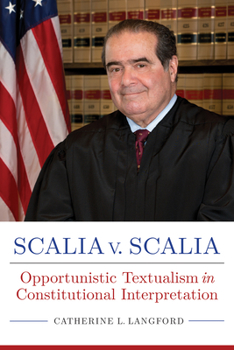Scalia V. Scalia: Opportunistic Textualism in Constitutional Interpretation
(Part of the Rhetoric, Law, and the Humanities Series)
An analysis of the discrepancy between the ways Supreme Court Justice Antonin Scalia argued the Constitution should be interpreted versus how he actually interpreted the law Antonin Scalia is considered one of the most controversial justices to have been on the United States Supreme Court. A vocal advocate of textualist interpretation, Justice Scalia argued that the Constitution means only what it says and that interpretations of the document should be confined strictly to the directives supplied therein. This narrow form of constitutional interpretation, which limits constitutional meaning to the written text of the Constitution, is known as textualism. Scalia v. Scalia: Opportunistic Textualism in Constitutional Interpretation examines Scalia's discussions of textualism in his speeches, extrajudicial writings, and judicial opinions. Throughout his writings, Scalia argues textualism is the only acceptable form of constitutional interpretation. Yet Scalia does not clearly define his textualism, nor does he always rely upon textualism to the exclusion of other interpretive means. Scalia is seen as the standard bearer for textualism. But when textualism fails to support his ideological aims (as in cases that pertain to states' rights or separation of powers), Scalia reverts to other forms of argumentation. Langford analyzes Scalia's opinions in a clear area of law, the cruel and unusual punishment clause; a contested area of law, the free exercise and establishment cases; and a silent area of law, abortion. Through her analysis, Langford shows that Scalia uses rhetorical strategies beyond those of a textualist approach, concluding that Scalia is an opportunistic textualist and that textualism is as rhetorical as any other form of judicial interpretation.
Format:Hardcover
Language:English
ISBN:0817319700
ISBN13:9780817319700
Release Date:January 2018
Publisher:University Alabama Press
Length:176 Pages
Weight:0.95 lbs.
Dimensions:0.7" x 6.3" x 9.2"
Customer Reviews
0 rating





